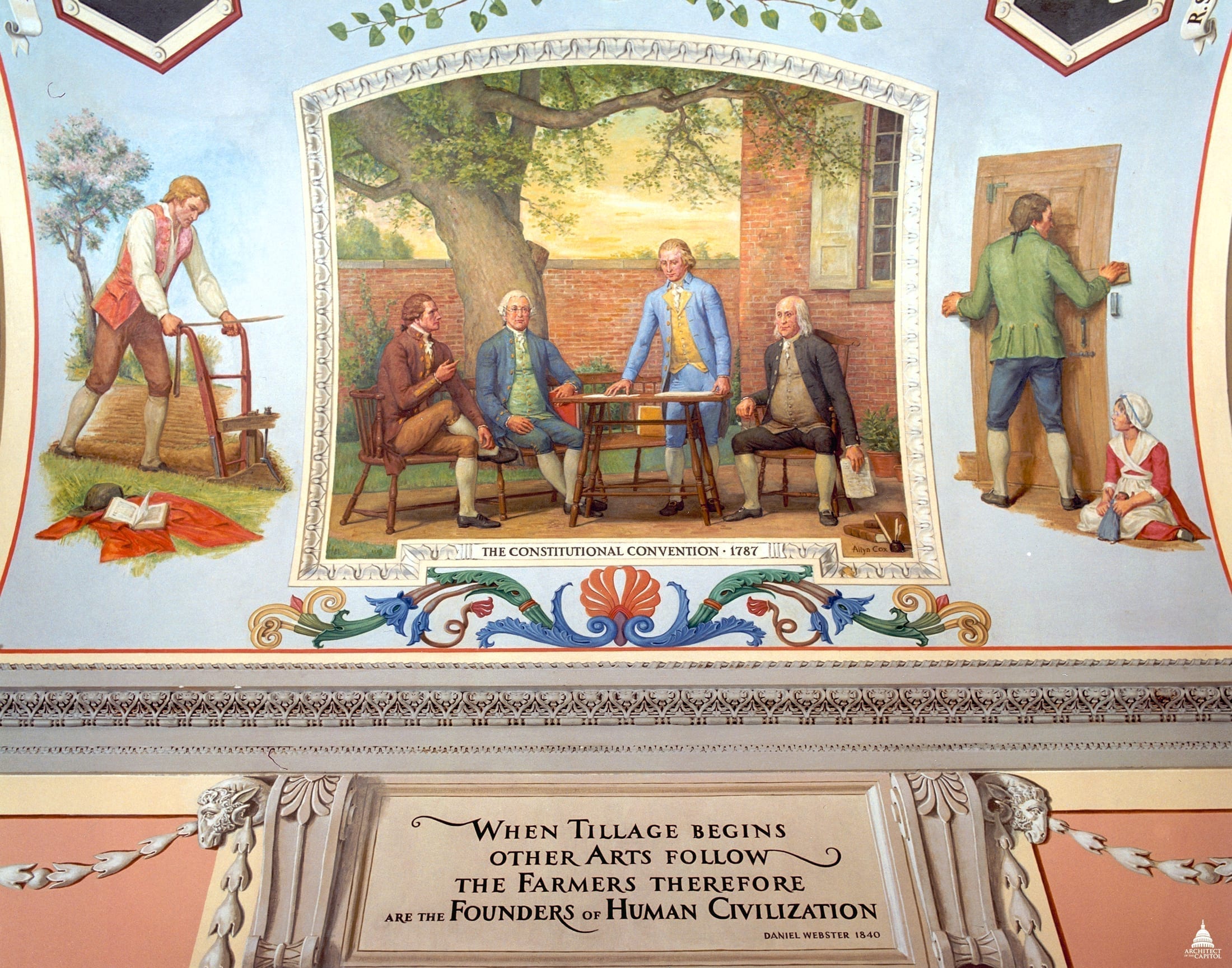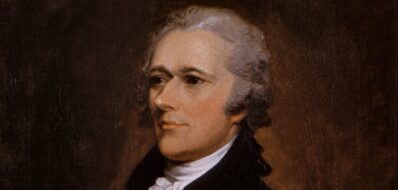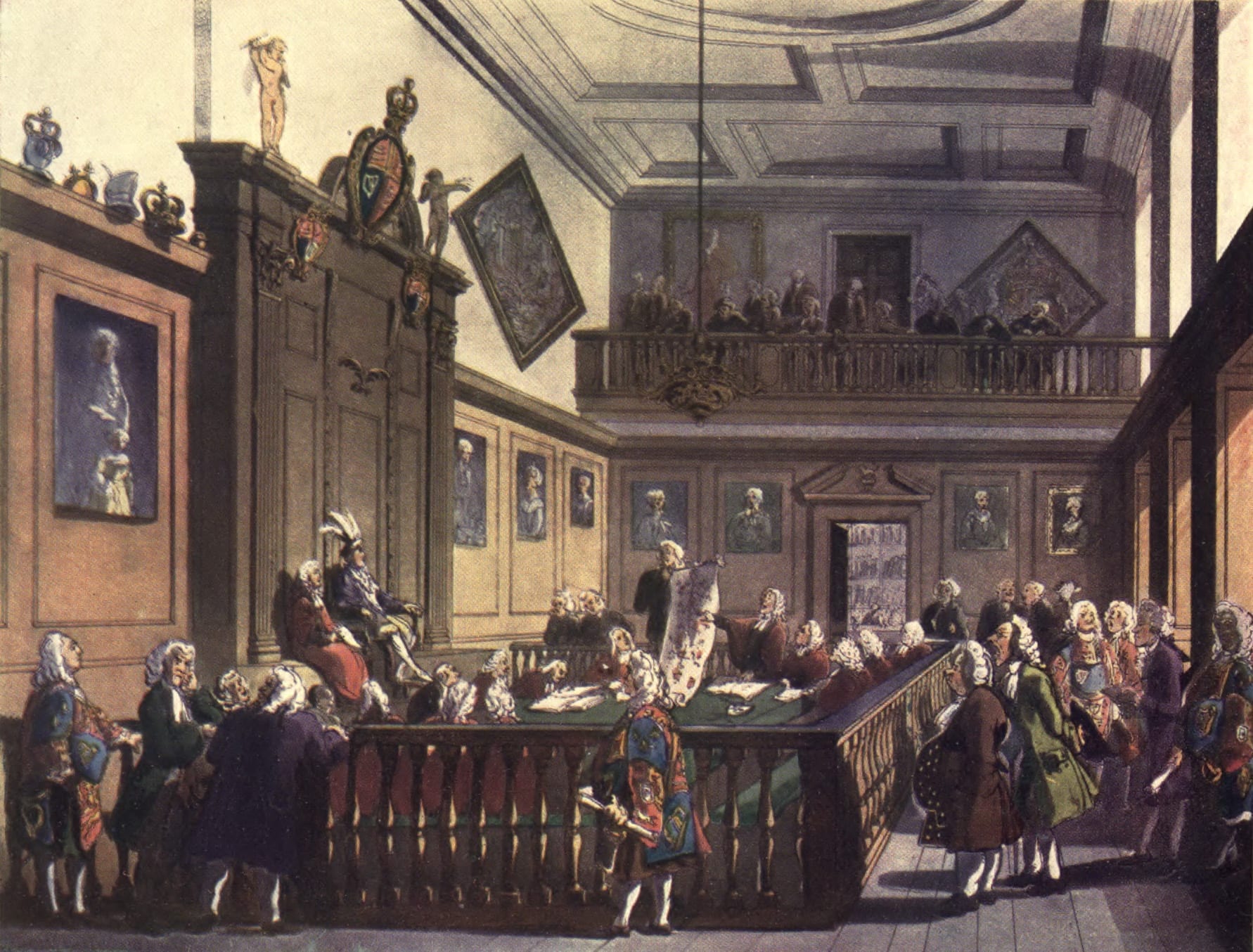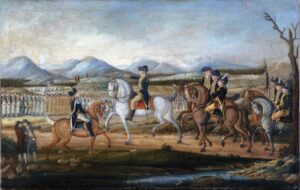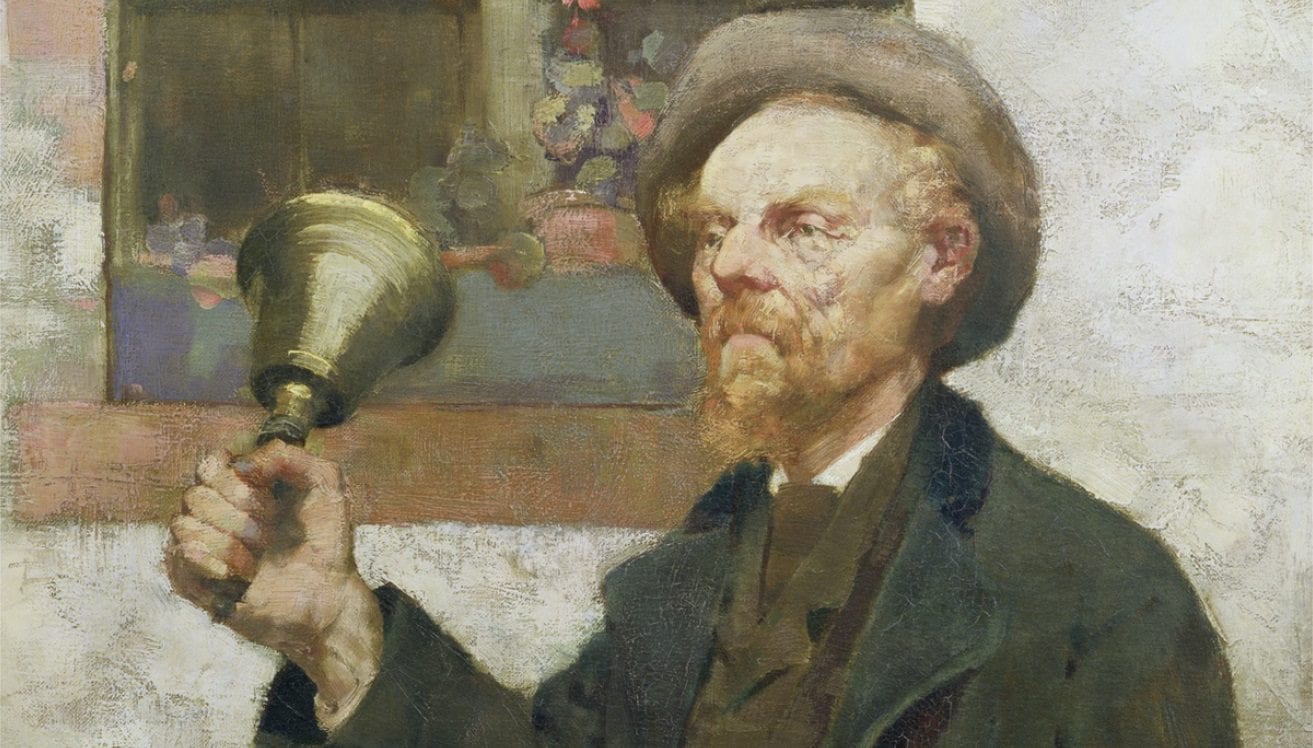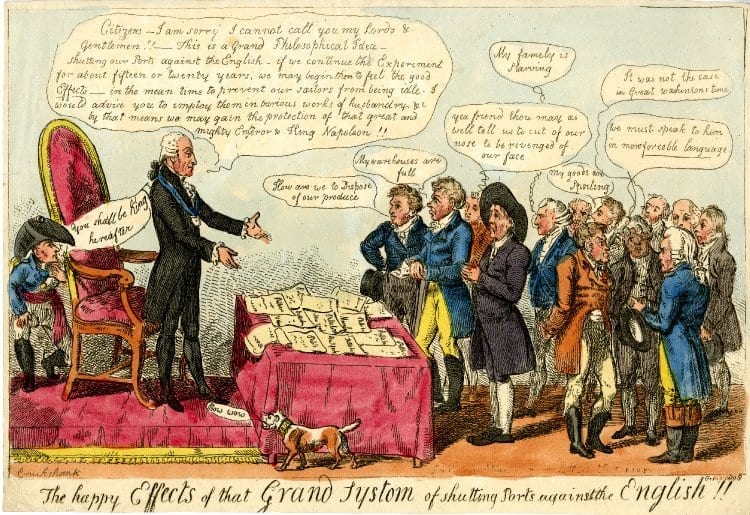
No study questions
No related resources
We have now viewed the whole structure of government; we have now ranged over its numerous apartments and divisions and we have examined the materials of which it is formed. For what purpose has this magnificent palace been erected? For the residence and accommodation of the sovereign, Man.
Does man exist for the sake of government? Or is government instituted for the sake of man?
Is it possible, that these questions were ever seriously proposed? Is it possible, that they have been long seriously debated? Is it possible, that a resolution, diametrically opposite to principle, has been frequently and generally given of them in theory? Is it possible, that a decision, diametrically opposite to justice, has been still more frequently and still more generally given concerning them in practice? All this is possible: and I must add, all this is true. It is true in the dark; it is true even in the enlightened portions of the globe.
At, and nearly at the commencement of these lectures, a sense of duty obliged me to enter into a controversial discussion concerning the rights of society: the same sense of duty now obliges me to enter into a similar discussion concerning the rights of the constituent parts of society — concerning the rights of men. To enter upon a discussion of this nature, is neither the most pleasant nor the most easy part of my business. But when the voice of obligation is heard, ease and pleasure must preserve the respectful silence, and show the cheerful acquiescence, which become them.
What was the primary and the principal object in the institution of government? Was it — I speak of the primary and principal object — was it to acquire new rights by a human establishment? Or was it, by a human establishment, to acquire a new security for the possession or the recovery of those rights, to the enjoyment or acquisition of which we were previously entitled by the immediate gift, or by the unerring law, of our all-wise and all-beneficent Creator?
The latter, I presume, was the case: and yet we are told, that, in order to acquire the latter, we must surrender the former; in other words, in order to acquire the security, we must surrender the great objects to be secured. That man “may secure some liberty, he makes a surrender in trust of the whole of it.” — These expressions are copied literally from the late publication of Mr. Burke.
Tyranny, at some times, is uniform in her principles. The feudal system was introduced by a specious and successful maxim, the exact counterpart of that, which has been advanced by Mr. Burke — exact in every particular but one; and, in that one, it was more generous. The free and allodial proprietors of land were told that they must surrender it to the king, and take back — not merely “some,” but — the whole of it, under some certain provisions, which, it was said, would procure a valuable object — the very object was security — security for their property. What was the result? They received their land back again, indeed; but they received it, loaded with all the oppressive burthens of the feudal servitude — cruel, indeed; so far as the epithet cruel can be applied to matters merely of property.
But all the other rights of men are in question here. For liberty is frequently used to denote all the absolute rights of men. “The absolute rights of every Englishman,” says Sir William Blackstone, “are, in a political and extensive sense, usually called their liberties.”
And must we surrender to government the whole of those absolute rights? But we are to surrender them only — in trust: — another brat of dishonest parentage is now attempted to be imposed upon us: but for what purpose? Has government provided for us a superintending court of equity to compel a faithful performance of the trust? If it had; why should we part with the legal title to our rights?
After all; what is the mighty boon, which is to allure us into this surrender? We are to surrender all that we may secure “some:” and this “some,” both as to its quantity and its certainty, is to depend on the pleasure of that power, to which the surrender is made. Is this a bargain to be proposed to those, who are both intelligent and free? No. Freemen, who know and love their rights, will not exchange their armour of pure and massy gold, for one of a baser and lighter metal, however finely it may be blazoned with tinsel: but they will not refuse to make an exchange upon terms, which are honest and honourable — terms, which may be advantageous to all, and injurious to none.
The opinion has been very general, that, in order to obtain the blessings of a good government, a sacrifice must be made of a part of our natural liberty. I am much inclined to believe, that, upon examination, this opinion will prove to be fallacious. It will, I think, be found, that wise and good government — I speak, at present, of no other — instead of contracting, enlarges as well as secures the exercise of the natural liberty of man: and what I say of his natural liberty, I mean to extend, and wish to be understood, through all this argument, as extended, to all his other natural rights.
This investigation will open to our prospect, from a new and striking point of view, the very close and interesting connexion, which subsists between the law of nature and municipal law. This investigation, therefore, will richly repay us for all the pains we may employ, and all the attention we may bestow, in making it.
“The law,” says Sir William Blackstone, “which restrains a man from doing mischief to his fellow citizens, though it diminishes the natural, increases the civil liberty of mankind.” Is it a part of natural liberty to do mischief to any one?
In a former part of these lectures, I had occasion to describe what nattural liberty is: let us recur to the description, which was then given. “Nature has implanted in man the desire of his own happiness; she has inspired him with many tender affections towards others, especially in the near relations of life; she has endowed him with intellectual and with active powers; she has furnished him with a natural impulse to exercise his powers for his own happiness, and the happiness of those for whom he entertains such tender affections. If all this be true, the undeniable consequence is, that he has a right to exert those powers for the accomplishment of those purposes, in such a manner, and upon such objects, as his inclination and judgment shall direct; provided he does no injury to others; and provided some publick interests do not demand his labours. This right is natural liberty.”
If this description of natural liberty is a just one, it will teach us, that selfishness and injury are as little countenanced by the law of nature as by the law of man. Positive penalties, indeed, may, by human laws, be annexed to both. But these penalties are a restraint only upon injustice and overweening self-love, not upon the exercise of natural liberty.
In a state of natural liberty, every one is allowed to act according to his own inclination, provided he transgress not those limits, which are assigned to him by the law of nature: in a state of civil liberty, he is allowed to act according to his inclination, provided he transgress not those limits, which are assigned to him by the municipal law. True it is, that, by the municipal law, some things may be prohibited, which are not prohibited by the law of nature: but equally true it is, that, under a government which is wise and good, every citizen will gain more liberty than he can lose by these prohibitions. He will gain more by the limitation of other men’s freedom, than he can lose by the diminution of his own. He will gain more by the enlarged and undisturbed exercise of his natural liberty in innumerable instances, than he can lose by the restriction of it in a few.
Upon the whole, therefore, man’s natural liberty, instead of being abridged, may be increased and secured in a government, which is good and wise. As it is with regard to his natural liberty, so it is with regard to his other natural rights.
But even if a part was to be given up, does it follow that all must be surrendered? “Man,” says Mr. Burke, “cannot enjoy the rights of an uncivil and of a civil state together.” By an “uncivil” contradistinguished from a “civil state, he must here mean a state of nature: by the rights of this uncivil state, he must mean the rights of nature: and is it possible that natural and civil rights cannot be enjoyed together? Are they really incompatible? Must our rights be removed from the stable foundation of nature, and placed on the precarious and fluctuating basis of human institution? Such seems to be the sentiment of Mr. Burke: and such too seems to have been the sentiment of a much higher authority than Mr. Burke — Sir William Blackstone.
In the Analysis of his Commentaries, he mentions “the right of personal security, of personal liberty, and of private property” — not as the natural rights, which, I confess, I should have expected, but — as the “civil liberties” of Englishmen. In his Commentaries, speaking of the same three rights, he admits that they are founded on nature and reason; but adds “their establishment, excellent as it is, is still human.” Each of those rights he traces severally and particularly to magna charta, which he justly considers as for the most part declaratory of the principal grounds of the fundamental laws of England. He says indeed, that they are “either that residuum of natural liberty, which is not required by the laws of society to be sacrificed to publick convenience; or else those civil privileges, which society has engaged to provide, in lieu of the natural liberties so given up by individuals.” He makes no explicit declaration which of the two, in his opinion, they are; but since he traces them to magna charta and the fundamental laws of England; since he calls them “civil liberties;” and since he says expressly, that their establishment is human; we have reason to think, that he viewed them as coming under the latter part of his description — as civil privileges, provided by society, in lieu of the natural liberties given up by individuals. Considered in this view, there is no material difference between the doctrine of Sir William Blackstone, and that delivered by Mr. Burke.
If this view be a just view of things, the consequence, undeniable and unavoidable, is, that, under civil government, individuals have “given up” or “surrendered” their rights, to which they were entitled by nature and by nature’s law; and have received, in lieu of them, those “civil privileges, which society has engaged to provide.”
If this view be a just view of things, then the consequence, undeniable and unavoidable, is, that, under civil government, the right of individuals to their private property, to their personal liberty, to their health, to their reputation, and to their life, flow from a human establishment, and can be traced to no higher source. The connexion between man and his natural rights is intercepted by the institution of civil society.
If this view be a just view of things, then, under civil society, man is not only made for, but made by the government: he is nothing but what the society frames: he can claim nothing but what the society provides. His natural state and his natural rights are withdrawn altogether from notice: “It is the civil social man,” says Mr. Burke, “and no other, whom I have in my contemplation.”
If this view be a just view of things, why should we not subscribe the following articles of a political creed, proposed by Mr. Burke.
“We wished, at the period of the revolution, and we now wish to derive all we possess, as an inheritance from our forefathers. Upon that body and stock of inheritance, we have taken care not to innoculate any cyon alien to the nature of the original plant. All the reformations we have hitherto made, have proceeded upon the principle of reference to antiquity; and I hope, nay I am persuaded, that all those, which possibly may be made hereafter, will be carefully formed upon analogical precedent, authority, and example.”
“Our oldest reformation is that of magna charta. You will see that Sir Edward Coke, that great oracle of our law, and indeed all the great men who follow him, to Blackstone, are industrious to prove the pedigree of our liberties.”
Let us observe, by the way, that the only position, relating to this subject, for which I find the authority of my Lord Coke quoted, is a position, to which every one, who knows the history of the common law, will give his immediate and most unreserved assent: the position is — “that magna charta was, for the most part, declaratory of the principal grounds of the fundamental laws of England.” But Mr. Burke proceeds.
“They endeavour to prove, that the ancient charter, the magna charta of King John, was connected with another positive charter from Henry the first; and that both the one and the other were nothing more than a reaffirmance of the still more ancient standing law of the kingdom. In the matter of fact, for the greater part, these authors appear to be in the right; perhaps not always: but if the lawyers mistake in some particulars, it proves my position still the more strongly; because it demonstrates the powerful prepossession towards antiquity, with which the minds of all our lawyers and legislators, and of all the people whom they wish to influence, have been always filled; and the stationary policy of this kingdom in considering their most sacred rights and franchises as an inheritance.”
It is proper to pause here a little. — If, in tracing the pedigree of our “most sacred rights,” one was permitted to indulge the same train of argument and reflection, which would be just and natural in the investigation of inferiour titles, we should be prompted to inquire, how it happens, that “mistakes in some particulars” would prove more strongly the general point to be established. Would mistakes in some particulars respecting a title to land, or the genealogy of a family, prove more strongly the validity of one, or the antiquity of the other?
But I must do Mr. Burke justice. The reason, which he assigns, why the making of those mistakes proves his position the more strongly, is, because it proves the “powerful prepossession towards antiquity.” Of this prepossession I will controvert neither the existence nor the strength: but I will ask — does it prove the point in question? — Does it prove the truth and correctness of even the civil pedigree of the liberties of England? Is predilection an evidence of right? Is property or any thing else, which is in litigation, decided to belong to him, who shows the strongest affection for it? If, in a controversy concerning an inferiour object, the person, who claims it, and who undertakes to substantiate his claim, should own, that, in deducing his chain of title, some mistakes were made; but should urge even those mistakes as an argument in his behalf, because his perseverance in his suit, notwithstanding those mistakes, demonstrates his powerful attachment for the thing in dispute; what would a discerning court — what would an unbiassed jury think of his conduct? I believe they would not think that it paid any extraordinary compliment, either to their impartiality or to their understanding.
I begin now to hesitate, whether we should subscribe the political creed of Mr. Burke. Let us, however, proceed and examine some of its other articles. Some one, it seems, had been so hardy as to allege, that the king of Great Britain owes his crown to “the choice of his people.” This doctrine, says Mr. Burke, “affirms a most unfounded, dangerous, illegal, and unconstitutional position.” “Nothing can be more untrue, than that the crown of this kingdom is so held by his majesty.” To disprove the assertion, “that the king of Great Britain owes his crown to the choice of his people,”Mr. Burke has recourse to the declaration of rights, which was made at the accession of King William and Queen Mary. “This declaration of right,” says he, “is the corner stone of our constitution, as reenforced, explained, improved, and in its fundamental principles for ever settled. It is called an `act for declaring the rights and liberties of the subject, and for settling the succession of the crown.” These rights and this succession are declared in one body, and bound indissolubly together.” “It is curious,”adds he, “with what address the temporary solution of continuity in the line of succession”– for it was impossible for Mr. Burke not to admit that from this line a temporary deviation was made — “it is curious with what address this temporary solution is kept from the eye; whilst all that could be found in this act of necessity, to countenance the idea of an hereditary succession is brought forward, and fostered, and made the most of by the legislature.” “The legislature,” he proceeds, “had plainly in view the act of recognition of the first of Queen Elizabeth, and that of James the first, both acts strongly declaratory of the inheritable nature of the crown; and, in many parts, they follow, with a nearly literal precision, the words and even the form, which is found in these old declaratory statutes.” “They give the most solemn pledge, taken from the act of Queen Elizabeth, as solemn a pledge as ever was or can be given in favour of an hereditary succession. `The lords spiritual and temporal, and commons, do, in the name of all the people aforesaid, most humbly and faithfully submit themselves, their heirs and posterities for ever; and do faithfully promise, that they will stand to, maintain, and defend their said majesties, and also the limitation of the crown, herein specified and contained, to the utmost of their power.”
I have mentioned above, that tyranny, at some times, is uniform in her principles: I have done her full justice: she is not so at all times. Of truth, liberty, and virtue, it is the exclusive prerogative to be always consistent.
Let us, for a moment, adopt the statement, which Mr. Burke has given us. Upon that statement I ask — if the humble and faithful submission of the parliament, in the name of all the people, was sufficient, in the time of Elizabeth, to bind themselves, their heirs and posterity for ever, to the line of hereditary succession; how came it to pass, that, in the time of William and Mary, the parliament, in the name of all the people, was justified in deviating, even for an instant, from the succession in that hereditary line? I ask again — if the humble and faithful submission of the parliament, in the name of all the people, was, in the sixteenth century, insufficient to bind their heirs and posterity in the seventeenth century; how comes it to pass that, in the seventeenth century, the humble and faithful submission of the parliament, in the name of all the people, could bind their heirs and posterity in the eighteenth century? Such a submission was either sufficient or it was not sufficient for that binding purpose: let the disciples of the doctrine, which rests on this dilemma, choose between the alternatives.
I have now no hesitation whether we should or should not subscribe the creed of Mr. Burke: that creed, which is contradictory to itself, cannot, in every part, be sound and orthodox.
But, to say the truth, I should not have given myself the trouble of delivering, nor you, of hearing these annotations upon it; unless it had derived the support, which it claims, from the Commentaries on the laws of England. The principles delivered in those Commentaries are never matters of indifference: I have already mentioned, “that when they are not proper objects of imitation, they furnish excellent materials of contrast.”
Government, in my humble opinion, should be formed to secure and to enlarge the exercise of the natural rights of its members; and every government, which has not this in view, as its principal object, is not a government of the legitimate kind.
Those rights result from the natural state of man; from that situation, in which he would find himself, if no civil government was instituted. In such a situation, a man finds himself, in some respects, unrelated to others; in other respects, peculiarly related to some; in still other respects, bearing a general relation to all. From his unrelated state, one class of rights arises: from his peculiar relations, another class of rights arises: from his general relations, a third class of rights arises. To each class of rights, a class of duties is correspondent; as we had occasion to observe and illustrate, when we treated concerning the general principles of natural law.
In his unrelated state, man has a natural right to his property, to his character, to liberty, and to safety. From his peculiar relations, as a husband, as a father, as a son, he is entitled to the enjoyment of peculiar rights, and obliged to the performance of peculiar duties. These will be specified in their due course. From his general relations, he is entitled to other rights, simple in their principle, but, in their operation, fruitful and extensive. His duties, in their principle and in their operation, may be characterized in the same manner as his rights. In these general relations, his rights are, to be free from injury, and to receive the fulfilment of the engagements, which are made to him: his duties are, to do no injury, and to fulfil the engagements, which he has made. On these two pillars principally and respectively rest the criminal and the civil codes of the municipal law. These are the pillars of justice.
Of municipal law, the rights and the duties of benevolence are sometimes, though rarely, the objects. When they are so, they will receive the pleasing and the merited attention.
You now see the distribution, short, and simple, and plain, which will govern the subsequent part of my system of lectures. From this distribution, short, and simple, and plain as it is, you see the close and very interesting connexion between natural and municipal law. You see, to use again my Lord Bacon’s language, how the streams of civil institutions flow from the fountain of justice.
I am first to show, that a man has a natural right to his property, to his character, to liberty, and to safety.
His natural right to his property, you will permit me, at present, to assume as a principle granted. I assume it for this reason; because I wish not to anticipate now what will be introduced, with much greater propriety and advantage, when I come to the second great division of my lectures, in which I am to treat concerning things.
To his character, every one has a natural right. A man’s character may, I think, be described as the just result of those opinions, which ought to be formed concerning his talents, his sentiments, and his conduct. Opinions, upon this as upon every other subject, ought to be founded in truth. Justice, as well as truth, requires, concerning characters, accuracy and impartiality of opinion.
Under some aspects, character may be considered as a species of property; but, of all, the nearest, the dearest, and the most interesting. In this light it is viewed by the Poet of nature —
The purest treasure mortal times afford
Is spotless reputation.
Who steals my purse, steals trash.
’Twas mine; ’tis his; and has been slave to thousands;
But he who filches from me my good name,
Takes from me that, which not enriches him,
But makes me poor indeed.
By the exertion of the same talents and virtues, property and character both are often acquired: by vice and indolence, both are often lost or destroyed.
The love of reputation and the fear of dishonour are, by the all-gracious Author of our existence, implanted in our breasts, for purposes the most beneficent and wise. Let not these principles be deemed the growth of dispositions only which are weak or vain; they flourish most luxuriantly in minds, the strongest and, let me add, the most humble. Of the happiness of heaven, a part of the unerring description is — that it is “full of glory.”
Well may character, then, be considered as one of the natural rights of man: well may it be classed among those rights, the enjoyment of which it is the design of good government and laws to secure and enlarge: well does it deserve their encouragement and protection; for, in its turn, it assists their operations, and supplies their deficiencies.
I remarked, a little while ago, that the rights and the duties of benevolence are but rarely, though they are at some times, the objects of municipal law. The remark may be extended to rights and duties of many other kinds. To many virtues, legal rewards are not, nor can they be, assigned: with legal impunity, many vices are, and must be, suffered to escape. But before a court of honour those qualities and sentiments and actions are amenable, which despise the subtlest process of the tribunals of law, and elude the keenest vigilance of the ministers of justice. This court, powerful in its sentences as well as extensive in its jurisdiction, decrees to virtue, and to the virtuous exertion of talents, a crown of fame, pure and splendid: vice, and idleness, less odious only than vice, it dooms to wear the badges of infamy, dirty and discoloured. This court, therefore, in a government of which virtue is the principle and vice is the bane, ought to receive, from all its institutions, the just degree of favour and regard.
Honour’s a sacred tie —
The noble mind’s distinguishing perfection,
That aids and strengthens virtue, where it meets her.
The Poet adds —
And imitates her actions, where she is not.
The moral descriptions of Mr. Addison are seldom inaccurate. On this occasion, however, I must declare that I think him liable to the charge of inaccuracy. The counterfeit of virtue should not be dignified with the appellation of honour.
It is the sentiment of some writers, highly distinguished too by their liberal and manly principles, that honour is peculiar to governments which are monarchical. “In extreme political liberty,” says the Marquis of Beccaria, “and in absolute despotism, all ideas of honour disappear, or are confounded with others. In the first case, reputation becomes useless from the despotism of the laws; and, in the second, the despotism of one man, annulling all civil existence, reduces the rest to a precarious temporary personality. Honour, then, is one of the fundamental principles of those monarchies, which are a limited despotism; and in these, like revolutions in despotick states, it is a momentary return to a state of nature and original equality.”
How prevalent even among enlightened writers, is the mistaken opinion, that government is subversive of equality and nature! Is it necessarily so? By no means. When I speak thus, I speak confidently, because I speak from principle fortified by fact. Let the constitution of the United States — let that of Pennsylvania be examined from the beginning to the end. No right is conferred, no obligation is laid on any, which is not laid or conferred on every, citizen of the commonwealth or Union — I think I may defy the world to produce a single exception to the truth of this remark. Now, as I showed at large in a former part of my lectures, the original equality of mankind consists in an equality of their duties and rights.
That honour is the principle of monarchical governments, is the well known doctrine of the celebrated Montesquieu. But let us examine the nature and qualities of that honour which he describes. It is that honour which can subsist without honesty; for he says expressly,20 that, in well policied monarchies, there are very few honest men. It is that honour which forbids not adulation, nor cunning, nor craft. It is that honour which judges of actions not as they are good, but as they are showy; not as they are just, but as they are grand; not as they are reasonable, but as they are extraordinary. It is, in one word, that honour, which fashions the virtues just as it pleases, and extends or limits our duties by its own whimsical taste. To this honour, indeed, truth in conversation is a necessary point: but is this for the sake of truth? By no means.
For the possession of this honour — vicious in its practice, and, even when right in its practice, vicious in its principle — a republican government will not, I presume, contend. But to that honour, whose connexion with virtue is indissoluble, a republican government produces the most unquestionable title. The principle of virtue is allowed to be hers: if she possesses virtue, she also possesses honour. I admire the fine moral and political instruction, as well as the elegant architectural taste, exhibited by the justly framed structure, in which the temple of honour was accessible only through the temple of virtue.
Viewed in this light, the honour of character is a property, which is, indeed, precious. But let it be remembered, that, in this view, it is a property, which must be purchased. To claim that reputation which we do not deserve, is as absurd, though it is not as bare-faced, as to claim that property which is not ours. The only difference is, that, in the former case, we claim generally that which belongs to another, while, in the latter case, we claim that which only does not belong to ourselves. In both cases, the claim is equally unfounded.
To bestow on another that reputation which he does not deserve, is equally profuse, and, in many instances, is more unjust than to bestow on him that property, to which he is not, on the principles either of justice, or charity, or benevolence, entitled. As it is equally profuse, it is more to be guarded against. In the latter case, we bestow what is our own, and, therefore, are inclined to be cautious: in the former case, we are apt to be inconsiderate, because what we bestow is not ours. Indiscriminate pride is not so odious, but it is as useless and it is as heedless as indiscriminate censure. In one important particular they precisely coincide. They have an equal tendency to destroy and to render inefficacious the great distinction between right and wrong, approbation and disapprobation, virtue and vice.
If it is unwarrantable to bestow reputation where it is not due, what epithet shall we assign to that conduct, which plucks the wreath of honour from those temples, around which it has been meritoriously placed? Robbery itself flows not from a fountain so rankly poisoned as that, which throws out the waters of malicious defamation.
The subject of reputation will again come under your view, when I treat concerning prosecutions for libels and actions of slander: both of which suppose an unjustifiable aggression of character. What I have now said will suffice to point to the general principles, on which those actions and prosecutions should be defended, supported, and determined.
Property must often — reputation must always be purchased: liberty and life are the gratuitous gifts of heaven.
That man is naturally free, was evinced in a former lecture: I will not reiterate what has been advanced.
I shall certainly be excused from adducing any formal arguments to evince, that life, and whatever is necessary for the safety of life, are the natural rights of man. Some things are so difficult; others are so plain, that they cannot be proved. It will be more to our purpose to show the anxiety, with which some legal systems spare and preserve human life; the levity and the cruelty which others discover in destroying or sporting with it; and the inconsistency, with which, in others, it is, at some times, wantonly sacrificed, and, at other times, religiously guarded.
In Sparta, nothing was deemed so precious as the life of a citizen. And yet in Sparta, if an infant, newly born, appeared, to those who were appointed to examine him, ill formed or unhealthy, he was, without any further ceremony, thrown into a gulph near mount Taygetus. Fortunate it was for Mr. Pope — fortunate it was for England, which boasts Mr. Pope — that he was not born in the neighbourhood of mount Taygetus.
At Athens, the parent was empowered, when a child was born, to pronounce on its life or its death. At his feet it was laid: if he took it in his arms, this was received as the gracious signal for its preservation: if he deigned not a look of compassion on the fruit of his loins, it was removed and exposed. Over almost all the rest of Greece, this barbarity was permitted or authorized.
In China, the practice of exposing new born children is said to have prevailed immemorially, and to prevail still. As the institutions of that empire are never changed, its situation is never improved.
Tacitus records it to the honour of the Germans, that, among them, to kill infants newly born was deemed a most flagitious crime. Over them, adds he, good manners have more power, than good laws have over other nations. This shows, that, in his time, the restraints of law began to be imposed on this unnatural practice; but that its inveteracy had rendered them still inefficacious.
Under the Roman commonwealth, no citizen of Rome was liable to suffer a capital punishment by the sentence of the law. But at Rome, the son held his life by the tenure of his father’s pleasure. In the forum, the senate, or the camp, the adult son of a Roman citizen enjoyed the publick and private rights of a person: in his father’s house, he was a mere thing; confounded, by the laws, with the cattle, whom the capricious master might alienate or destroy, without being responsible to any tribunal on earth.
The gentle Hindoo is laudably averse to the shedding of blood; but he carries his worn out friend or benefactor to perish on the banks of the Ganges.
With consistency, beautiful and undeviating, human life, from its commencement to its close, is protected by the common law. In the contemplation of law, life begins when the infant is first able to stir in the womb. By the law, life is protected not only from immediate destruction, but from every degree of actual violence, and, in some cases, from every degree of danger.
The grades of solicitude; discovered, by the law, on the subject of life, are marked, in the clearest manner, by the long and regular series of the different degrees of aggression, which it enumerates and describes — threatening, assault, battery, wounding, mayhem, homicide. How those different degrees may be justified, excused, alleviated, aggravated, redressed, or punished, will appear both in the criminal and in the civil code of our municipal law.
Thus much concerning the natural rights of man in what has been termed his unrelated state. I come now to specify and to consider those peculiar relations, by virtue of which a man is entitled to the enjoyment of peculiar rights, and obliged to the performance of peculiar duties.
I begin with marriage, which forms the near relation between husband and wife.
Whether we consult the soundest deductions of reason, or resort to the best informationconveyed to us by history, or listen to the undoubted intelligence communicated in holy writ, we shall find, that to the institution of marriage the true origin of society must be traced. By that institution the felicity of Paradise was consummated; and since the unhappy expulsion from thence, to that institution, more than to any other, have mankind been indebted for the share of peace and harmony which has been distributed among them. “Prima societas in ipso conjugio est,” says Cicero in his book of offices; a work which does honour to the human understanding and the human heart.
The most ancient traditions of every country ascribe to its first legislators and founders, the regulations concerning the union between the sexes. The honour of instituting marriage among the Chinese, is assigned to their first sovereign, Fo-hi. In order to render this great foundation of society respectable, he adjusted, as we are told, the ceremonies, with which the contracts of marriage were accompanied.
Among the Egyptians, the law of marriage is said to have been established by Menes, whose name is transmitted to us as that of their first king. The history of Abraham affords a striking instance of the profound respect, which in his day was paid, in Egypt, to the conjugal union.
Cecrops has been already mentioned as the first great legislator of the Athenians, and as borrowing his institutions from those of the Egyptians. Accordingly we are informed, that he established, at Athens, the laws and ceremonies of marriage, in the same manner as they were observed and practised in Egypt. Polygamy was not permitted. These regulations are described as the sources of virtues and enjoyments. They evinced the advantages of decency, the attractions of modesty, the happiness of loving, and the necessity of constancy in love.
The founder of Rome made, concerning marriages, a law, which, on many accounts, will deserve our particular attention. It was expressed in these words: “let every wife, who by the holy laws of marriage falls into the power of a husband, enter with him into a community of goods and sacrifices.”
As marriage has been instituted by the first, it has always been encouraged by the wisest legislators. By the law of Moses, a man, during one year after his marriage, was exempted from publick burthens, and from going to war. A regulation nearly similar, as we are told, was established by the Incas of Peru.The jus trium liberorum, introduced by the prudent policy of Augustus, was a permanent inducement to matrimony at Rome.
Legislators have, with great propriety, carried their views still farther; they have provided, as far as municipal law can provide, against the violation of rights, indispensably essential to the purity and harmony of the matrimonial union. Treachery, upon any occasion, is sufficient to stain a page in the annals of life; but perfidy against the solemn engagements of marriage obliterates the impression of happiness from every subsequent part of the conjugal history. Upon this subject, however, so interesting to the finest sentiments and emotions of the heart, every thing, that might be wished, cannot, we fear, be expected from the operation of human laws. Much must be left to the influence of that legitimate honour, which we have described as the inseparable friend and companion of virtue. From the bastard honour, which we likewise described, it would be ridiculous, in this case, to hope for any assistance. In this case, as in many others, that honour glories in its shame.
Concerning the ancient Germans, Tacitus, in his short but masterly account of their manners, informs us, that among them the laws of marriage were rigidly observed; and that no part of their conduct was more exemplary.
We have seen the first institution of marriage among the Athenians and the Romans: a concise view of its history will be instructive and interesting.
In the heroick ages of Greece, we are told, the rights of beauty and feminine weakness were highly respected and tenderly observed. The simplicity of those ages was equally remote from the cruel tyranny of savages, which condemns the fair sex to servitude, and the sordid selfishness of luxury, which considers them solely as instruments of pleasure. Hence those affecting scenes so exquisitely described by Homer, which, in the interviews of Hector and Andromache, exhibit the most striking image of nuptial felicity and love. But this beautiful picture of ancient manners was soon miserably defaced; and, in the degenerate periods of Greece, the fair sex were as much neglected and despised, as they had been loved and admired in the heroick ages.
In those degraded times, of which I am now obliged to speak, no pains were employed to render the Grecian females agreeable members of society, in any one part of their lives. Education was either entirely withheld from them; or it was directed to such objects as were fitted to contract and debase, instead of elevating and enlarging the mind. When they were grown up, they were thrown away in marriage, without being consulted in the choice; and by entering into this new state, they found the severe guardianship of a father succeeded by the absolute dominion of a husband. At this period, even the laws of Athens countenanced this unworthy tenour of conduct: to secure the fortune of the husband was deemed an object of greater importance, than to protect the person and honour of the wife, from the outrage so peculiarly dreaded by female virtue.
Let us now turn our attention to Rome. You recollect, that, by a law of Romulus, “the wife fell into the power of the husband.” The law, which, on the whole, was very susceptible of a construction mild and generous, received from this part of it an interpretation most unwarrantable and severe. By this interpretation, coloured with the unnatural fiction, that, on a solemn marriage, the wife was adopted by the husband, he acquired over her all the tremendous plenitude of Roman paternal power. This extreme, as is usual, soon produced its opposite; and female servitude was exchanged for female licentiousness. The solemnities of the ancient nuptials were declined, in order to avoid the odious consequences superinduced upon them by the construction and fiction of law; and the parties, without losing, on either side, their independence or their name, subscribed definite and stipulated articles of a marriage contract. Their cohabitation, and the appearances of a common interest
Opinion on the Constitutionality of a National Bank
February 15, 1791
Conversation-based seminars for collegial PD, one-day and multi-day seminars, graduate credit seminars (MA degree), online and in-person.






